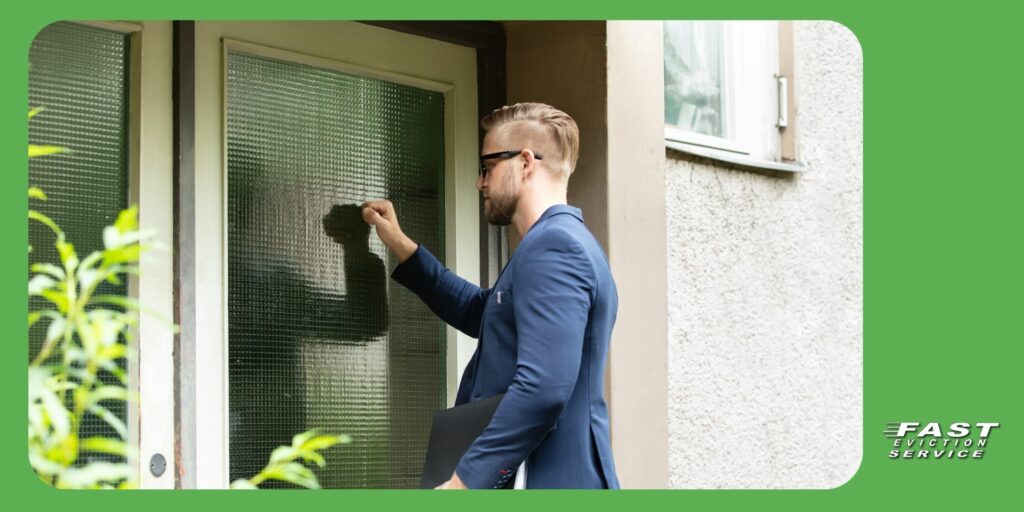You are represented at all times by one of our California Eviction Attorneys | 1-800-686-8686 | intake@fastevict.com | Se habla español
When Can a Landlord Enter Their Rental Property in California?
Updated 12/17/24
Understanding when and how you can legally enter your rental property is crucial for maintaining a healthy relationship with your tenants while avoiding legal pitfalls. The laws regarding landlord access to a tenant’s home are specific and designed to balance your right as a property owner with your tenant’s right to privacy. This article will explore the rules governing landlord entry, when a landlord can enter without permission, and how to manage notices to enter the property to avoid conflicts.

Table of Contents
- Overview of California’s Landlord Entry Laws
- When Can a Landlord Enter Without Permission in California?
- When Is a Landlord Required to Give Notice?
- Legal Consequences for Violating Entry Laws
- Best Practices for Landlord’s Entry and Notice to Enter
- Frequently Asked Questions (FAQs)
Overview of California’s Landlord Entry Laws
Under California law, a landlord has specific rights when it comes to entering their rental property, but these rights are not unlimited. The California Civil Code Section 1954 outlines the circumstances under which a landlord can enter a tenant’s rental unit. It is essential for landlords to understand these guidelines to avoid potential legal consequences or disputes with tenants.
The law mandates that landlords must respect the privacy of tenants, and while they have the right to access the property, they must do so under clearly defined conditions. So, when can a landlord enter their rental property in California? The answer lies in the balance between the landlord’s interests and the tenant’s rights.
When Can a Landlord Enter Without Notice in California?
In California, a landlord cannot simply enter a rental property at will. However, there are specific situations where a landlord may enter without permission from the tenant. The law specifies that landlords may enter the property without prior notice under the following circumstances:
- Emergency Situations: If there is an emergency that poses a threat to the safety of the property or individuals, a landlord may enter the rental unit without notice. Emergencies can include situations such as fire, flooding, or a gas leak.
- Tenant Abandonment or Abandonment of Property: If a tenant leaves the property unexpectedly, especially if they have abandoned the lease, the landlord can enter the property to inspect or make repairs.
- Court Order or Legal Requirement: In rare cases, a landlord may enter the rental property if there is a court order allowing them to do so. This would typically occur in situations where the tenant is violating the lease or engaged in illegal activity.
While these scenarios provide exceptions to the general notice requirement, they are narrowly defined and should be used only when necessary. Entering a property under other circumstances without the tenant’s permission can lead to disputes or legal action.
When Is a Landlord Required to Give Notice?
In most situations, landlords are required to provide notice before entering a rental property. California law mandates that the landlord give at least 24 hours’ notice if they intend to enter the unit for any of the following reasons:
- Routine Inspections: A landlord can enter to inspect the property, such as during an annual or semi-annual inspection. Landlords must give notice of their intent to inspect and state the reason for the inspection.
- Repairs or Maintenance: If the landlord needs to perform repairs or maintenance on the property, they must provide adequate notice. The notice should clearly explain what work will be done, when, and why it is necessary.
- Showings to Potential Tenants or Buyers: If the landlord intends to show the rental property to prospective tenants or buyers, they must provide the tenant with notice.
The notice must include the date, time, and purpose of entry. California law allows this notice to be given in writing or orally, but written notice is generally preferred to avoid misunderstandings.
Can a Landlord Enter Without Notice?
The short answer is no, except in specific circumstances. California law is strict about landlord access and places a high priority on tenant privacy. A landlord cannot enter the rental property without proper notice for reasons such as personal convenience, for non-emergency repairs, or simply because the landlord feels like entering.
Even if a landlord intends to check on the property for minor concerns, such as checking the condition of appliances or inspecting for damage, they must still give the tenant the required 24-hour notice. Failure to do so can result in a violation of the tenant’s rights and could potentially lead to a claim for harassment or unlawful entry.
Legal Consequences for Violating Entry Laws
Landlords who fail to follow the legal requirements for entering rental property can face serious consequences. A tenant may take legal action against the landlord for invasion of privacy or harassment if they believe the landlord entered the property without proper notice or authorization.
In some cases, repeated unauthorized entries could even result in the tenant being able to terminate the lease early without penalty. In extreme cases, the tenant could file a lawsuit for damages resulting from the unauthorized entry.
It’s also worth noting that the law provides tenants with the ability to seek punitive damages if the landlord’s actions are deemed particularly egregious. Therefore, ensuring compliance with entry notice rules is essential to avoiding legal disputes and maintaining a professional relationship with tenants.
Best Practices for Landlord’s Entry and Notice to Enter
To avoid legal issues and potential disputes, landlords should follow these best practices when entering a rental property:
- Always Provide Written Notice: While oral notice may be acceptable, written notice is always the best option for clarity and record-keeping. Use certified mail or email to document that the tenant has received notice.
- Be Specific About Purpose and Timing: The notice should include the date and time of entry, along with a clear explanation of the reason for entering the property. If the tenant is unavailable or cannot accommodate the proposed time, try to find a mutually agreeable alternative.
- Respect Tenant Privacy: Make every effort to enter the property only when absolutely necessary. Avoid entering the rental unit unless you have a clear reason, and always prioritize your tenant’s privacy.
- Maintain Clear Communication: If you’re entering for repairs or maintenance, keep your tenants informed about the work being done and the expected timeline. Communicating effectively can help avoid misunderstandings and build trust.
Frequently Asked Questions (FAQs)
Can a landlord enter without permission in California if they suspect the tenant is damaging the property?
No. Even if a landlord suspects property damage, they must still give 24 hours’ written notice before entering for an inspection. However, if there is an emergency, the landlord may enter immediately without notice.
Can a landlord enter without notice for routine inspections in California?
No, routine inspections require a 24-hour written notice. The landlord must state the purpose and time of entry, and the inspection cannot be excessively frequent.
Can a landlord enter a rental property for non-emergency repairs without notice?
No, repairs require 24-hour notice unless it is an emergency situation. The landlord must provide details about the work to be done and the reason for the repairs.



